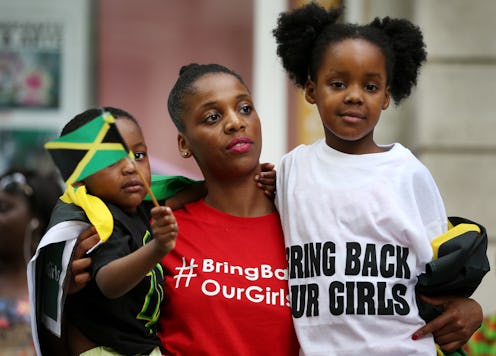News
100 More Nigerian Girls Were Just Kidnapped — And You Need To Know About It

Four years after the kidnapping of 276 Nigerian schoolgirls shocked the world and incited the #BringBackOurGirls hashtag, the terrorist group Boko Haram has done it again. On Feb. 19, a group of the militants abducted more than 100 girls from a school in Dapchi, Nigeria, a town in the northeastern part of the country. Families are worried sick, and many are criticizing the government's response to the crisis.
The girls — whose names have been published by the Nigerian government — are all between the ages of 11 and 19. The attack happened around 7 p.m. local time, when many of them were in the mosque or in their boarding houses. Boko Haram militants reportedly drove up to the school and announced that they were there to help the students. They fired their guns in the air while walking through the compound and ushering girls to follow them.
According to accounts reported by students at the school, the militants claimed that they were government soldiers who'd come to protect them from a Boko Haram attack, reportedly saying that they were "here to rescue you." Some girls believed them and willingly got into their vehicles. Others ran and were captured. Some got away and have been speaking about the raid.
"They deceived us," 15-year-old Amina Abubakar Mohamadu told the Nigerian newspaper Vanguard. "They came with three vans in army colors and they had army uniform, but they didn't have army boots, and that is how some of us identified them."
BBC News visited the school where the abduction took place and filmed the debris from the scene of the attack, including littered shoes and school materials that the girls left behind as they fled.
The big sister of one missing girl told BBC News that she is distraught with worry. "I can't stop thinking about [my sister]," she said. "The worst thing is that we don't know how she is, we don't know what she is going through."
Nigerian newspaper The Daily Trust reported that half of the girls may have been taken to Niger, the border of which lies around 45 miles north of Dapchi. The other half may have been taken to a Boko Haram enclave in the Nigerian state of Borno to the east of Dapchi.
The government is currently directing a search party for the girls. President Muhammadu Buhari announced on Feb. 21 that he had sent a federal delegation to the area to "ascertain the situation." Two days later, he tweeted that "no effort will be spared to ensure that all of them are returned safely, and the attackers arrested and made to face justice."
But many Nigerians are unconvinced by the president's assurances that the authorities are doing all they can to find the missing girls. The government was particularly criticized for issuing several false statements in the immediate aftermath of the attack. First, officials said that the girls had not actually been kidnapped; then they suggested that some of them had been found.
"I don't know why the government has not reacted faster," the father of one missing girl told BBC News. "But these are not the children of senior politicians, they are the children of poor men."
Still more blame the government for the attack in the first place, especially after it became known that a group of security forces had left the area around Dapchi just 21 days before the attack, significantly weakening the town's defenses. In response to this criticism, the Nigerian army released a statement explaining that it left because the spot seemed "relatively calm and peaceful."
The Dapchi attack recalls the huge attack in 2014, in which 276 girls were abducted from a school in the town of Chibok, which also lies in the northeastern part of the country. Many of those girls were found or returned — including 82 whose release was negotiated in May 2017 — but over 100 are still missing.
Boko Haram has abducted or killed tens of thousands of people over the course of its existence. The group wants to impose sharia law and opposes Western values; in fact, its name means "Western education is forbidden."
Although its factions operate in several countries in West and Central Africa, the group originated in Nigeria and still has its heaviest presence there. These days, Boko Haram is primarily found in the country's northeastern states, including Yobe, where Dapchi is located.